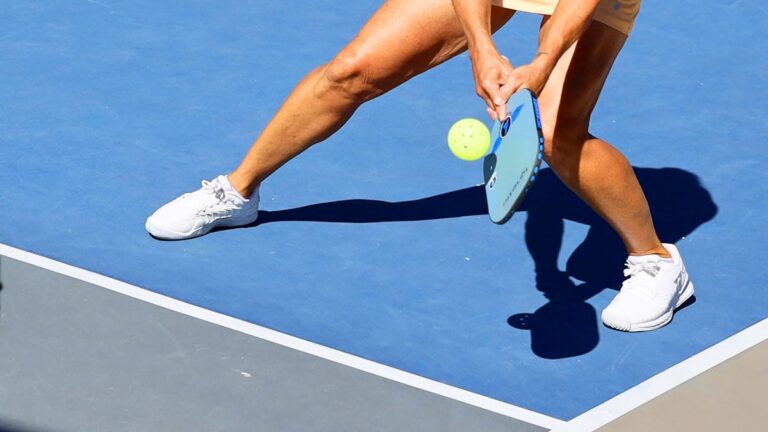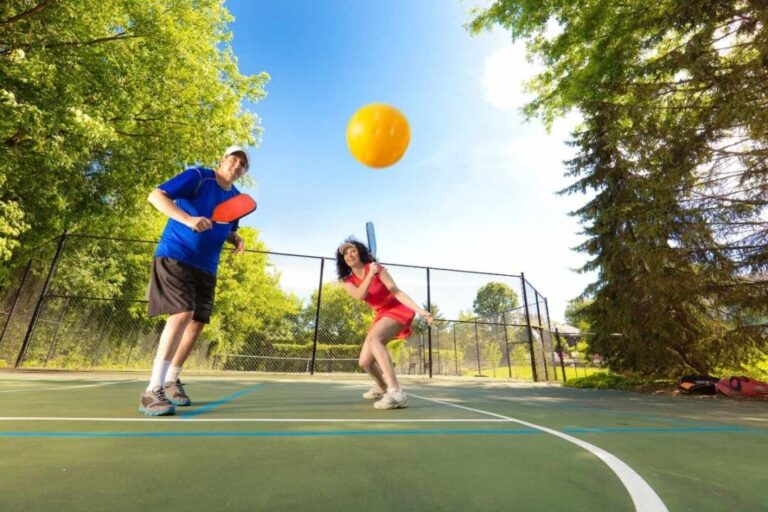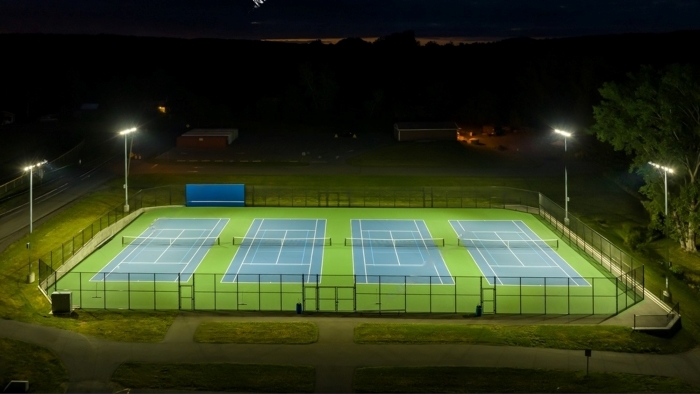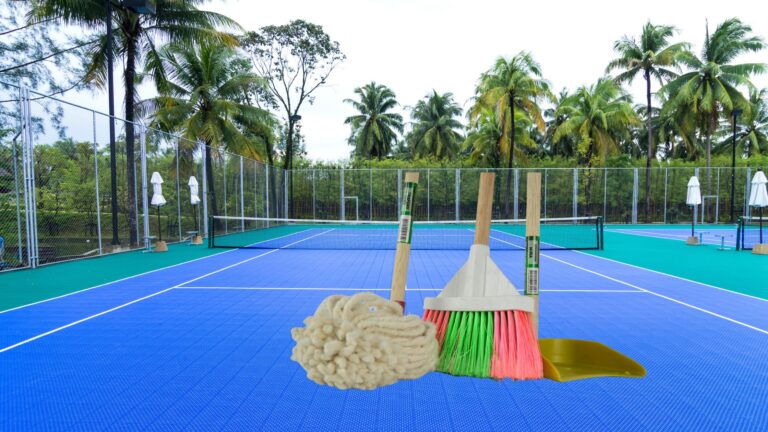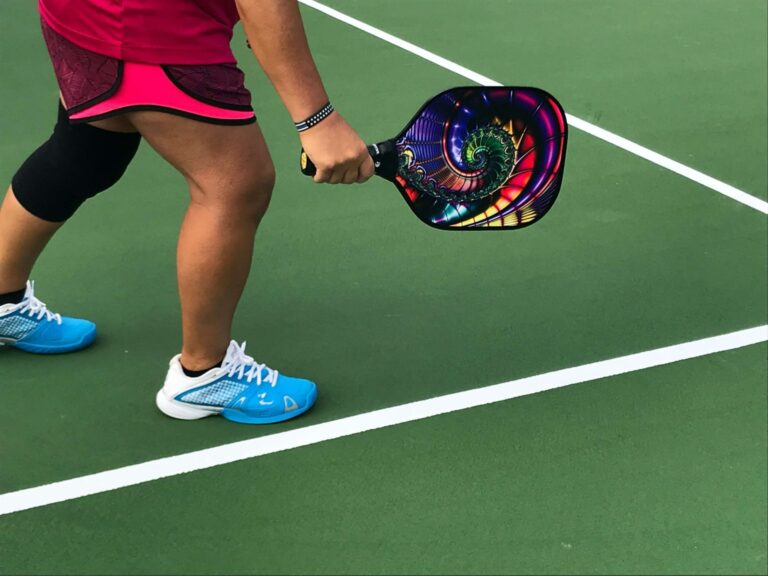How to Become a Professional Pickleball Player: Your Guide to Going Pro
To become a professional pickleball player, master the fundamentals, develop advanced skills, and build mental toughness. Train hard, compete strategically, and climb the ranks in tournaments. Prioritize physical fitness, injury prevention, and a well-rounded training program. Build your personal brand, network within the pickleball community, and navigate the professional landscape to attract sponsors and create new opportunities.
Key Takeaways: Your Path to Becoming a Professional Pickleball Player
- Assess your readiness: Evaluate your passion, dedication, age, and financial resources to determine if pursuing a professional pickleball career is right for you.
- Master the fundamentals: Develop a deep understanding of the game’s rules, unique features, and essential skills like dinking, volleying, serving, and strategic gameplay.
- Invest in the right equipment and training: Choose high-quality paddles, shoes, and attire, and work with a qualified coach to create a personalized training program that includes skill development, footwork and agility drills, and mental game strategies.
- Compete and climb the ranks: Start with local and regional tournaments, and gradually progress to larger, more competitive events to earn rankings points and move up the professional ladder.
- Prioritize physical fitness and health: Develop a comprehensive training program that includes strength, cardiovascular, and flexibility training, as well as proper nutrition, hydration, and injury prevention techniques.
- Navigate the professional landscape: Understand the role of professional pickleball organizations, the path to competing at the highest level, and strategies for managing travel, expenses, and sponsorships.
- Build your brand and network: Create a strong personal brand, leverage social media, and network with other players, coaches, and industry professionals to attract sponsors, grow your fan base, and create new opportunities.
- Treat your pickleball career as a business: Understand contracts, prize money, and earnings potential, and develop strategies for managing finances, balancing pickleball with other income streams, and planning for the long-term.
By following these key steps and maintaining a strong work ethic, strategic approach, and passion for the game, you’ll be well on your way to achieving your dream of becoming a professional pickleball player.
Is Going Pro Right for You?
Before diving into the nitty-gritty of how to become a professional pickleball player, it’s essential to assess whether this path is right for you. Here are a few key factors to consider:
Passion and Dedication
Pickleball demands a significant time commitment. Are you ready to eat, sleep, and breathe the game? Professional players spend countless hours training, practicing, and competing. It’s not just a hobby—it’s a lifestyle. If you’re truly passionate about pickleball and willing to put in the hard work, you’re off to a good start.
Age is a Factor
While some players turn pro later in life, the sport heavily favors younger athletes with peak physical conditioning. If you’re in your teens or early twenties, you may have a better chance of making it to the top. However, that doesn’t mean it’s impossible for older players to succeed. Many professional pickleball players have transitioned from other racquet sports and found success in their 30s and 40s.
Consider Your Finances
Pursuing the path of how to become a professional pickleball player requires a significant investment in equipment, coaching, and travel. Analyze your financial resources and determine if you have the means to support yourself while pursuing your dream. Keep in mind that sponsorships and brand deals can help offset some of these costs, but they’re not guaranteed, especially when you’re just starting out. Learn how Pickleball Players Are Rated?
Understanding the Game
Before you can embark on the journey of how to become a professional pickleball player, you need to have a solid understanding of the game itself. Let’s break down the basics:
The Basics of Pickleball
| Element | Description |
|---|---|
| Court Size | 20′ x 44′ |
| Net Height | 36″ at the sidelines, 34″ in the middle |
| Players | Singles or doubles |
| Equipment | Solid paddles and a perforated plastic ball |
| Scoring | Points are scored only by the serving team |
| Game Length | Typically played to 11 points, win by 2 |
Unique Aspects of Pickleball
Compared to other racquet sports like tennis and badminton, pickleball has a few unique features:
- The non-volley zone (also known as the “kitchen”) extends 7 feet from the net on each side. Players cannot volley the ball while standing in this area.
- The serve must be hit underhand and diagonally cross-court, landing in the opponent’s service court.
- The two-bounce rule requires that the ball bounce once on each side of the net before players can hit a volley.
Mastering the Fundamentals
To succeed in how to become a professional pickleball player, you must master the fundamental shots and strategies of the game. This includes:
- Dinking: A soft shot hit near the net, designed to keep the ball low and force your opponent to hit up.
- Volleying: Hitting the ball before it bounces, often used for aggressive net play.
- Serving: Mastering various serve types, such as the power serve and the spin serve.
- Third-shot drops: A crucial shot that helps you transition from the back of the court to the net.
Building Your Pickleball Arsenal
Having the right equipment and attire can make a significant difference in your performance on the court and your journey of how to become a professional pickleball player. Here’s what you need to know:
Equipment
Choosing the right paddle is crucial. Factors to consider include:
- Grip size: A paddle with the correct grip size will help you maintain control and prevent injury.
- Weight: Heavier paddles provide more power, while lighter paddles offer better maneuverability.
- Material: Paddles can be made from various materials, such as wood, composite, or graphite. Each has its own pros and cons in terms of power, control, and feel.
In addition to your paddle, investing in high-quality court shoes with good lateral support and traction is essential for preventing injuries and maintaining your agility on the court.
Pickleball Attire
When it comes to clothing, opt for breathable, moisture-wicking fabrics that allow for unrestricted movement. Many professional players wear branded apparel from their sponsors, but as a beginner, focus on comfort and functionality. Don’t forget to wear a hat or visor to shield your eyes from the sun and keep sweat out of your face.
Developing Your Skills
Becoming a professional pickleball player requires a commitment to continuous skill development. Here are some key areas to focus on in your quest of how to become a professional pickleball player:
Developing Core Skills
To take your game to the next level, focus on perfecting your:
- Dinking: Practice dinking drills to improve your touch and control at the net.
- Volleying: Work on your volleying technique to become a more aggressive net player.
- Serving: Develop a variety of serves to keep your opponents guessing and gain an advantage from the start of each point.
- Overhead smashes: Master the overhead smash to put away high balls and finish points quickly.
Footwork and Agility Drills
Efficient footwork and agility are essential for covering the court and reacting quickly to your opponent’s shots. Incorporate these drills into your training routine:
- Lateral shuffles: Practice shuffling side-to-side to improve your speed and coordination.
- Forward and backward sprints: Work on your acceleration and deceleration to move efficiently from the back of the court to the net and vice versa.
- Plyometric exercises: Incorporate jump squats, box jumps, and other explosive movements to increase your power and agility.
Strategic Gameplay
To outsmart your opponents and win more points, you need to develop a strategic approach to the game. This includes:
- Shot placement: Learn to place your shots effectively to keep your opponents off balance and create openings for winning shots.
- Reading your opponent: Pay attention to your opponent’s body language, tendencies, and weaknesses to anticipate their shots and adapt your strategy accordingly.
- Building a winning game plan: Develop a clear game plan based on your strengths and your opponent’s weaknesses. Stick to your plan and make adjustments as needed.
The Mental Game
Pickleball is as much a mental game as it is a physical one. To succeed at the professional level and truly understand how to become a professional pickleball player, you need to develop:
- Focus: Learn to stay focused and present in the moment, even under pressure.
- Resilience: Develop the mental toughness to bounce back from mistakes and setbacks.
- Adaptability: Be willing to adapt your strategy and mindset based on your opponent and the flow of the game.
Taking Your Game to the Next Level
To truly excel as a pickleball player and master how to become a professional pickleball player, you need to surround yourself with the right people and resources. Here’s how:
Find a Coach
Working with a qualified coach can make a world of difference in your development as a player. A good coach will:
- Identify your strengths and weaknesses
- Create personalized training programs tailored to your goals and needs
- Push you out of your comfort zone and help you reach your full potential
Look for a coach with experience in pickleball and a track record of success with other players. Don’t be afraid to invest in your growth—the right coach can help you fast-track your progress and avoid common pitfalls.
Join a Pickleball Club
Surrounding yourself with other passionate pickleball players is essential for your development and motivation. Joining a pickleball club gives you access to:
- Regular practice sessions and drills
- Competitive play against a variety of opponents
- A supportive community of players who share your love for the game
Look for a club that welcomes players of all skill levels and offers a range of programs and events to keep you engaged and challenged.Discover pickleball clubs and join a community of enthusiastic players. Get started today!
Compete in Tournaments
To truly test your skills and make a name for yourself in the pickleball world, you need to start competing in tournaments. Begin with local and regional events to gain experience and build your confidence. As you improve, gradually progress to larger, more competitive tournaments.
Remember, tournament play is different from casual games with friends. You’ll face tougher opponents, higher stakes, and more pressure. Embrace the challenge and use each tournament as an opportunity to learn, grow, and showcase your skills.
Training and Conditioning
To perform at your best on the court and excel in how to become a professional pickleball player, you need to prioritize your physical fitness and overall health. Here’s what you need to know:
The Importance of Physical Fitness
Professional pickleball players are athletes, and like any athlete, they need to be in peak physical condition to compete at the highest level. This means:
- Having the endurance to play long, grueling matches without fatigue
- Possessing the strength and power to hit explosive shots and cover the court quickly
- Maintaining the flexibility and agility to change direction and react to shots on a dime
Developing a Comprehensive Training Program
To build and maintain your physical fitness, you need a well-rounded training program that includes:
| Type of Training | Examples |
|---|---|
| Strength Training | Squats, lunges, deadlifts |
| Cardiovascular Training | Running, cycling, swimming |
| Flexibility Training | Yoga, stretching, mobility drills |
Work with a certified fitness professional or athletic trainer to create a customized training program that meets your specific needs and goals.
Proper Nutrition and Hydration
What you put into your body is just as important as how you train it. To fuel your performance and recovery, focus on:
- Eating a balanced diet rich in whole foods, lean proteins, and complex carbohydrates
- Staying hydrated before, during, and after training sessions and matches
- Avoiding processed foods, excessive sugar, and alcohol
Consider working with a sports nutritionist to develop an eating plan that supports your training and competition goals.
Staying Healthy
Injuries can derail your progress and keep you off the court for weeks or even months. To stay healthy and prevent injuries, prioritize:
- Proper warm-up and cool-down routines
- Regular rest and recovery days
- Listening to your body and backing off when you feel pain or fatigue
- Addressing minor injuries before they become major problems
By taking a proactive approach to your health and well-being, you’ll be better equipped to handle the rigors of professional pickleball and enjoy a long, successful career.
The Professional Pickleball Landscape
To navigate the world of professional pickleball and truly understand how to become a professional pickleball player, it’s important to understand the key players and pathways to success.
Professional Pickleball Organizations
The two main professional pickleball organizations are:
- Professional Pickleball Association (PPA): The PPA is the largest and most established professional pickleball tour, with events across the United States and a growing international presence.
- Association of Pickleball Professionals (APP): The APP is a newer tour that offers a series of tournaments with prize money and points toward the APP rankings.
Both organizations offer opportunities for players to compete at the highest level and earn rankings points and prize money.
Competing at the Professional Level
To compete on the professional pickleball tour, you’ll need to:
- Meet the eligibility requirements for each organization (e.g., age, skill level)
- Register for tournaments and pay entry fees
- Earn points and move up the rankings by performing well in tournaments
As you improve and gain more experience, you may have the opportunity to compete in higher-tier events with larger prize pools and more prestigious titles.
The Path to Pro
Becoming a professional pickleball player is a journey, not a destination. Here’s a general roadmap to follow:
- Start by competing in local and regional tournaments to gain experience and build your skills.
- As you improve, move up to larger, more competitive tournaments with stronger fields.
- Earn points and move up the rankings in your chosen professional organization (PPA or APP).
- Qualify for higher-tier events and compete against the best players in the world.
- Continue to train, improve, and compete at the highest level to establish yourself as a top professional player.
Remember, everyone’s path is different, and there’s no one “right” way to become a pro. Focus on your own growth and progress, and don’t compare yourself to others.
Managing Travel, Expenses, and Sponsorships
Competing on the professional pickleball tour requires significant travel and expenses. To manage these costs, many players:
- Share accommodations and transportation with other players
- Look for tournaments with lower entry fees or that offer housing and transportation assistance
- Seek out sponsorships and brand deals to offset costs and provide additional income
As you build your reputation and ranking, you may have more opportunities for sponsorships and other financial support. However, it’s important to be proactive and strategic in your approach to managing your finances and building your brand.
Building Your Brand and Network
In addition to your skills on the court, your success as a professional pickleball player depends on your ability to build your personal brand and network within the pickleball community.
The Value of Creating a Strong Personal Brand
Your personal brand is the unique combination of your skills, personality, and values that sets you apart from other players. A strong personal brand can help you:
- Attract sponsors and brand deals
- Build a loyal fan base and social media following
- Establish yourself as a thought leader and influencer in the pickleball world
To build your brand, focus on creating consistent, authentic content that showcases your personality and values. This can include:
- Posting regular updates and behind-the-scenes content on social media
- Writing blog posts or articles about your experiences and insights as a player
- Collaborating with other players or brands on content or events
Leveraging Social Media
Social media is a powerful tool for building your brand and engaging with fans and followers. To make the most of social media:
- Choose the platforms that best align with your brand and target audience (e.g., Instagram, TikTok, YouTube)
- Post regularly and consistently, with a mix of pickleball-related content and personal updates
- Engage with your followers by responding to comments and messages and asking for their input and feedback
- Use relevant hashtags and tag other players and brands to increase your reach and visibility
Remember, social media is a two-way conversation. Don’t just broadcast your own content—take the time to engage with and support other players and members of the pickleball community.
Networking with Other Players, Coaches, and Industry Professionals
Building relationships within the pickleball world is essential for your growth and success as a player. Take every opportunity to:
- Attend clinics, camps, and workshops to learn from experienced coaches and players
- Participate in exhibitions and charity events to give back to the community and build your network
- Collaborate with other players on training sessions, content creation, or other projects
- Attend industry events and conferences to meet sponsors, manufacturers, and other key players in the pickleball world
The more you put yourself out there and build genuine connections with others, the more opportunities will come your way. connect with a pickleball coach Today!
Sponsorship and Brand Deals
As you build your brand and network, you may start to attract interest from sponsors and brands looking to partner with up-and-coming players. Sponsorships and brand deals can provide:
- Financial support for travel, equipment, and other expenses
- Exposure and credibility through association with established brands
- Opportunities to create content and promote products or services
When evaluating potential sponsors or brand deals, look for companies that align with your values and goals as a player. Don’t be afraid to negotiate terms and ask for what you need to support your career and maintain your authenticity.
Giving Back to the Pickleball Community
As you grow and succeed as a professional player, it’s important to give back to the pickleball community that has supported you along the way. This can include:
- Coaching or mentoring younger players
- Running clinics or workshops to share your knowledge and skills
- Participating in charity events or fundraisers
- Advocating for the growth and development of the sport
By using your platform and influence to make a positive impact, you’ll not only help grow the sport of pickleball but also build goodwill and support for your own career.
Navigating the Business Side of Professional Pickleball
Becoming a professional pickleball player means more than just competing on the court—it also means running your career like a business. Here’s what you need to know:
Understanding Contracts, Prize Money, and Earnings Potential
As a professional player, you’ll need to understand the different types of contracts and agreements you may encounter, such as:
- Tournament entry and participation agreements
- Sponsorship and endorsement deals
- Coaching or teaching contracts
It’s important to read and understand these agreements carefully and to seek legal advice if needed to protect your interests and ensure fair compensation.
In terms of earnings potential, professional pickleball players can make money through:
- Tournament prize money
- Sponsorships and brand deals
- Coaching and teaching fees
- Merchandise sales and other entrepreneurial ventures
The amount you can earn will depend on your skill level, ranking, and ability to attract sponsors and other opportunities. While top players can make a comfortable living . Curious about how much a pro pickleball player earns? Find out now!

